Friedrich Nicolai (1733 - 1811) , bookseller, author and key figure of the early German Enlightenment, was also among many other things the author of a six-volume collection of Frederician anecdotes "Anekdoten von König Friedrich II. von Preussen, und von einigen Personen, die um ihn waren", published between 1788 (i.e. two years after Fritz' death) and 1792. They were part of a general rush of memoirs and anecdote colllections that went with a celebrity's death, but due to a life long passionate interest of Nicolai's better researched (in terms of what was available at the time) than most. Helpfully, Nicolai in 90% of the cases names his sources, and he
was friends with three people who could boast of a decades long relationship with Fritz: Quantz the flute specialist and composer, the Marquis d'Argens and Quintus Icilius. Also, to his credit, if Nicolai between volumes got new information contradicting what he had published earlier, he brought this up in the next volume. Unsurprisingly given the sheer length of Fritz' life and the time of publication, a great many of the anecdotes hail from the later half of his life and/or from the wars, but in six volumes, there are enough of interest from the first half as well to make the reading worth one's while. Volume I is dedicated to Fritz' sister Charlotte, and the dedication mentions having talked to her, too, about her noble brother. Reminder: Niicolai was bff with Gotthold Ephraim Lessing, writer of some of German's most enduring classic plays and theoretical essays, who had ended up as Charlotte's librarian in Wolfenbüttel. The preface also mentions his buddy Dr. Zimmermann encouraging to publish, which is of deeply ironic in hindsight, since they're about to fall out, which is the subject of another post. Another motive for being a Fritz fan, err, an intense scholar of the late King's character and life, Nicolai gives is that he grew up in Fritz' Prussia, all the ideas he has about enlightenment etc. were formed there, he would not be who he became without Fritz. Aw. As for Charlotte, she even provided Nicolai with two of Fritz' letters, one he wrote to her after the death of her son Leopold, and the other just six days before his own death, which Nicolai prints here for the first time. (In the French original.) He promises to the readers that if he gets new information contradicting anything he tells in his first volume, he'll include it in the subsequent ones (and will keep the promise.)
The condoling letter is very Fritz (in a mild way way, I hasten to add): we must all die, alas, be a philosopher, accept it, even though I totally feel your pain as a tender mother, live for me, you are the happiness of my life. On to the juicy parts. The following text excerpts mostly hail from volumes 1, 2 and 6.
( That time when FW nearly caught Fritz playing flute with Quantz and Katte saved the day )Nicolai's version of the 1730 escape attempt, in which he refutes some other versions as told in 1792 (this story is from the last volume, VI), consists of a letter written to him by a son of one of Katte's regiment comrades, Hertefeld, narrating his father's story. More about who said father was below, but first, the letter itself and Nicolai's introduction.
( Katte, Keith, Spaen and I: by Ludwig Casimir von Hertefeld )( So who was von Hertefeld? )![[personal profile]](https://www.dreamwidth.org/img/silk/identity/user.png) mildred_of_midgard
mildred_of_midgard used this and other information to reconstruct Peter von Keith's succesful escape from Wesel on a map:
( How to escape FW and live, by Peter von Keith )Now, just because Nicolai has eye witnesses doesn't, of course, mean what they say is 100& true. Not least because everyone is subjective as hell. Nowhere is this more evident than in Nicolai's Marquis D'Argens' based take on Friedrich's Sanssouci tableround, which is in volume 1.
( Marquis d'Argens: C'est moi, or: They were all rubbish except for me! )One story in which the Marquis plays an undeniable noble part, but which is depressing and frustrating in what it says about the status of Jewish citizens in Frederician Prussia, is the tale of how Moses Mendelssohn, one of the foremost philosophers of his age, the likely model of Lessing's Nathan the Wise and grandfather of Felix the composer, got the "letter of protection", the
Schutzbrief necessary for Jews to live in Berlin for reasons detailed in the story itself.
( How Moses Mendelssohn had to fight for citizenship )In order not to finish on this note, here's one last Nicolai anecdote from volume 1:
In the year 1785, the King talked with a worthy man about the manner in which a young prince should be raised so that he could become a good regent. Among other things about how a future regent had to learn early how to use his power, but also how not to abuse it. He added: "Several things by their very nature are of a matter that a regent must never extend his power to influence them. Chief among these: Religion and love!" This is in my opinion one of the truest and most noble thoughts the regent of a great realm has thought or said. (Or, as Voltaire expressed it: The freedom of thought and of the penis.)
Nicolai volume 2: opens with another promise to be truthful and correct when necessary in the preface, which also says if he'd known Unger would provide the public with so much of the Prince de Ligne's Fritz-meets-Joseph memoir (you know, the one which contains among other things the priceless "Fritz dressed in white to spare Austrian feelings" story) , he wouldn't have included his own translation here, especially since Unger didn't cut as much as he, Nicolai, had to. (BTW, Unger's translation is in the volume 17-19 Mildred just put up in the library.)
Then we get the volume proper which opens with the Ligne memoir in edited form, with Nicolai's annotations. The best bits were already in both Volz and the "
Fritz and MT as seen by their contemporaries" collection, so I already quoted them for you.
Nicolai has a major section about FW and music, opening by telling the readers that they may be surprised to learn FW didn't hate music per se, there was some music he liked.
( FW, Music Lover...in his own way )Nicolai mentions Fritz' depressed poems from the 7 Years War (among others, one to D'Argens) and since some of Voltaire's letters have now been printed, including two from that era where he urges Fritz to live, says that a sensitive heart could almost forgive Voltaire his dastardly behavior towards Fritz for the sake of these letters.
Otoh, he attacks "
the author of the Vie Privée du Roi de Prusse, most likely Voltaire" for slandering Fritz re: the Battle of Mollwitz, and for others following suit. Reminder: the issue here is that Fritz was persuaded by Schwerin to retire from the battlefield and the battle was one without him. Nicolai furiously defends Fritz from the charge of cowardice and says geography alone proves he can't have gotten as far as Ratibor, and anyway, everyone knows Fritz was the bravest! Nicholai then gives an account of the battle and does say Fritz never forgave Schwerin for having made the suggestion or himself for listening, which strikes me as accurate.
As Nicolai likes the Prince du Ligne's memoir about Fritz very much, he only has two mild corrections: one, that of course Prussian officers were all fluent in French and if some spoke German with the Marchese de Lucchessini, it's not because they didn't know French but because Lucchessini is fluent in German, and two, about the Antinuous statue. (For the full story of the "Antinous" statue as relating to Friedrich II. and Katte, see Mildred's write up
here. )
( Nicolai: Ligne is wrong about why the King liked to gaze at this statue! ) Spreaking of Friedrich's lonely hours, volume 2 also contains the inevitable dog anecdote:
Just like the King chose among his snuff boxes those he liked best, he chose among his greyhounds the companions of his lonely hours. Those who conducted themselves best were taken with him during the carnival times to Berlin.(Reminder: The carnival lasted from December til March in Frederician Prussia. As Sanssouci was a summer palace, Fritz spent that time in the city palace in Berlin.)
They were driven to Berlin in a six hourse equipage supervised by a so called royal little footman who was in charge of their feeding and care. One assures us that this footman always took the backseat so the dogs could take the front seat, and always adressed the dogs with "Sie", as in: "Biche, seien Sie doch artig!" (Biche, be good),
and "Alcmene, bellen Sie doch nicht so" (Alcmene, don't bark so much!)"
Nicolai finishes the volume by dissing Zimmermann's first Fritz publication; this, and the war between them is the subject of another post.



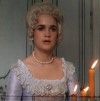



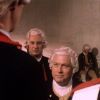

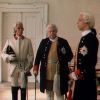
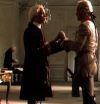





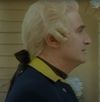




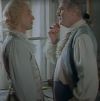

.png?width=590&height=370&fit=bounds)


